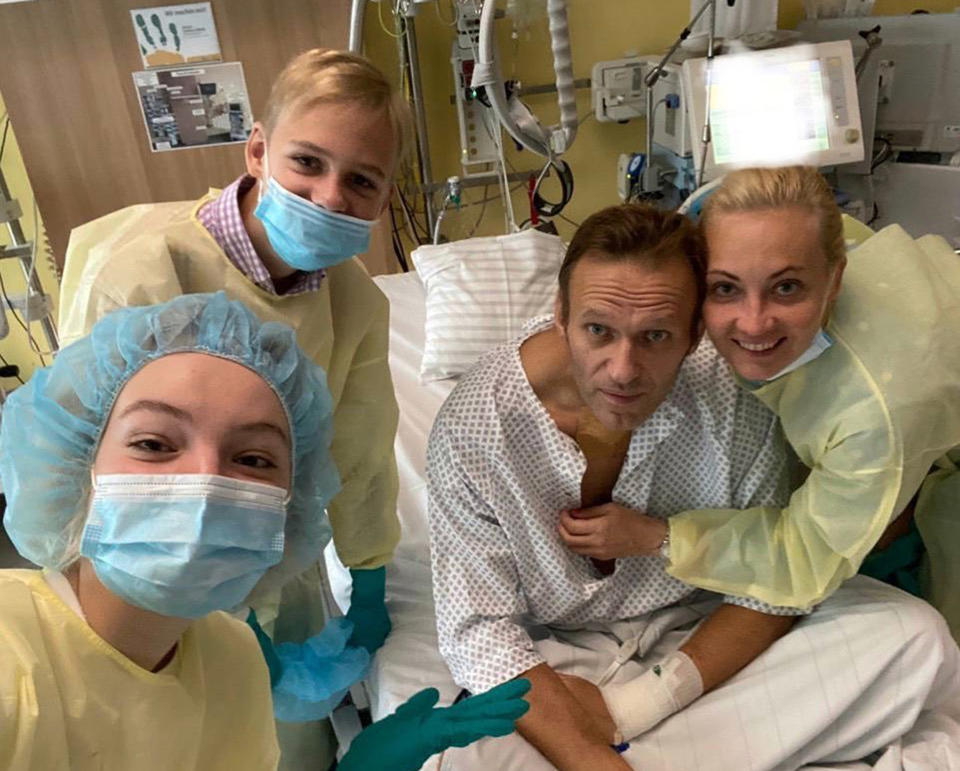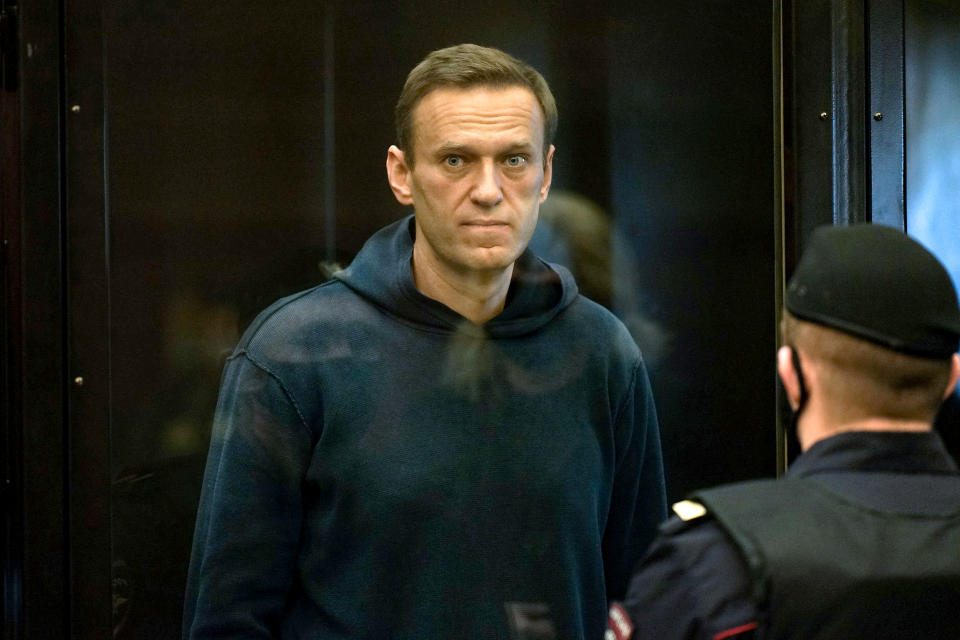Putin critic Navalny sentenced to nearly 3 years in prison
- Oops!Something went wrong.Please try again later.
- Oops!Something went wrong.Please try again later.
Russian opposition leader and main Kremlin critic Alexei Navalny was sentenced Tuesday to two years and eight months in prison after a Moscow court turned his suspended sentence in a 2014 criminal case into a full custodial term.
The court decision came days after more than 5,000 people were detained across Russia in rallies in Navalny’s support.
The politician was laughing in his glass box as the verdict was being read out, gesturing toward his allies and wife, Yulia, in the courtroom. He had earlier denounced court proceedings as politically motivated and demanded that he be freed.
Navalny received a suspended prison sentence for fraud in 2014, which the Russian authorities had asked the court to turn into a three-and-a-half-year term because of alleged parole violations. Navalny has always maintained that the case was fabricated against him to curb his political ambitions. The European Court of Human Rights deemed that the conviction was politically motivated.
In an expected decision Tuesday, the judge flipped the suspended sentence to the three-and-a-half-year jail term, but considered one year of house arrest already served, amounting to two years and eight months in prison overall. Navalny's lawyers said they will appeal the decision.
Hundreds of his supporters were arrested outside court while the hearing was taking place, according to the independent OVD-Info protest monitoring group. By early Wednesday, OVD-Info said more than 1,000 had been arrested nationwide, with 828 in Moscow.
After the court ruling, people started gathering in central Moscow despite heavy police presence after Navalny's team called on his supporters to come out in protest of the decision.
Navalny, 44, was poisoned and almost died while conducting a corruption investigation in Siberia last summer. He was airlifted to Germany for treatment after Russian doctors found no signs of poisoning. It was later determined that he had been poisoned with the Soviet-era nerve agent Novichok, which Navalny claims was ordered by President Vladimir Putin. The Kremlin has denied any involvement.
Earlier Tuesday, Navalny gave a fiery speech in court, reiterating his claim that the case against him has been fabricated, according to a transcription provided by Russia's TV Doghd news channel. Reporters were present but not allowed to bring cameras into the courtroom.
He said Putin was personally after him.

“He can pretend to be a great politician, but he will go down in history as a poisoner,” Navalny said. “We had Alexander the Liberator, Yaroslav the Wise and now we will have Vladimir the Poisoner of Underpants.”
Navalny was referring to his own investigation of his poisoning, which he claims revealed that his alleged assassins smeared poison on his underwear.
The point of his trial was not to jail him, but to intimidate his supporters, he said.
“This process won’t be perceived by people as a signal to be more afraid,” he said. “This is a demonstration of weakness, not strength.”
Illustrating the international interest in the case, foreign diplomats from at least 12 countries, including the United States and the United Kingdom, as well as the European Union, were in court to observe the hearing, the court confirmed to Russian news agency Interfax.
Foreign Ministry spokeswoman Maria Zakharova said on Facebook that the diplomats' presence "isn't just meddling in the internal affairs of a sovereign state, but the self-incrimination of the West's unsightly and illegal attempts to contain Russia."
As Navalny's trial was underway, Russian Foreign Minister Sergey Lavrov said Moscow has reasons to believe that the politician's poisoning was "a sham," Russia state news agency Tass reported.
Download the NBC News app for breaking news and politics
Navalny has been a thorn in Putin’s side for years with his anti-corruption investigations into the Kremlin elite. His latest investigation into a luxurious palace allegedly belonging to Putin has been viewed more than 100 million times on YouTube. The Russian president has denied he owns the palace.
Navalny was detained at a Moscow airport as he arrived from Berlin last month and called on his supporters and those frustrated with Putin’s regime to “abandon their fear” and take to the streets in protest.
His calls were heeded as tens of thousands of people joined protesters throughout Russia on Jan. 23 — despite freezing temperatures, coronavirus pandemic and multiple warnings from Russian authorities not to attend — in one of the biggest shows of discontent Russia has seen in recent years. Nearly 4,000 people were detained by police, some of them violently.
On Sunday, a similar-size crowd took to the streets again across the country amid high security in the country’s capital. More than 5,600, including journalists, were detained amid reports police used tear gas, tasers and batons to crack down on protesters.

Putin’s spokesperson Dmitri Peskov on Monday described the protesters as “hooligans” and “provocateurs,” who displayed “aggressive behavior” toward law enforcement.
Navalny’s detention and police crackdown on protesters have caused indignation from the U.S. and its European allies. Secretary of State Antony Blinken said the U.S. was "deeply concerned" by Navalny's sentencing.
"We reiterate our call for his immediate and unconditional release as well as the release of all those wrongfully detained for exercising their rights," Blinken said in a tweet.
It’s an issue that has put pressure on both the Kremlin and President Joe Biden as he is charting his foreign policy course on Russia.
French President Emmanuel Macron called the sentencing of Navalny unacceptable. "Political disagreement is never a crime. We call for his immediate release," Macron said in a statement.
Josep Borrell Fontelles, the European Union's high representative for foreign affairs and security policy, German Foreign Minister Heiko Maas, and United Kingdom Foreign Secretary Dominic Raab were also among those calling for his Navalny's immediate release.
"Today’s perverse ruling, targeting the victim of a poisoning rather than those responsible, shows Russia is failing to meet the most basic commitments expected of any responsible member of the international community," Raab said in a statement.
Yuliya Talmazan and Patrick Smith reported from London; Matt Bodner reported from Moscow.
Reuters contributed to this report.

